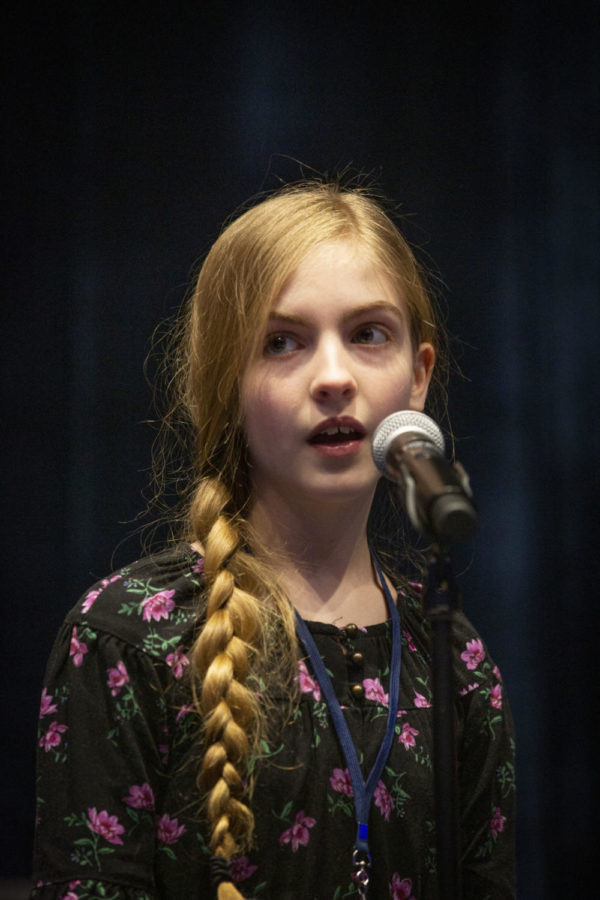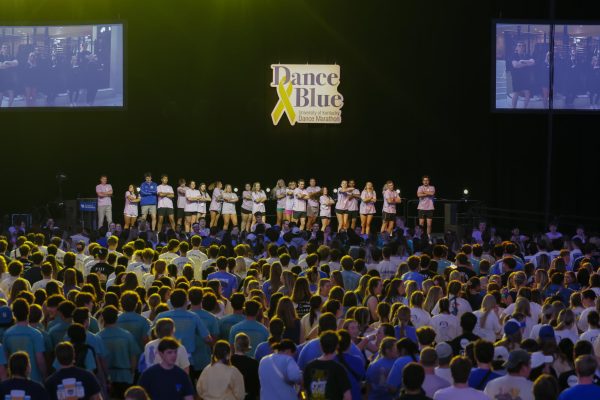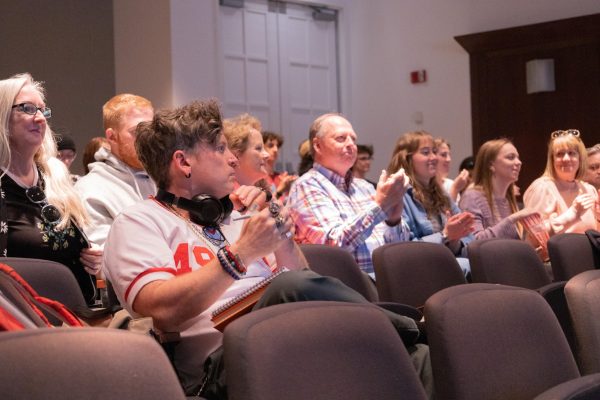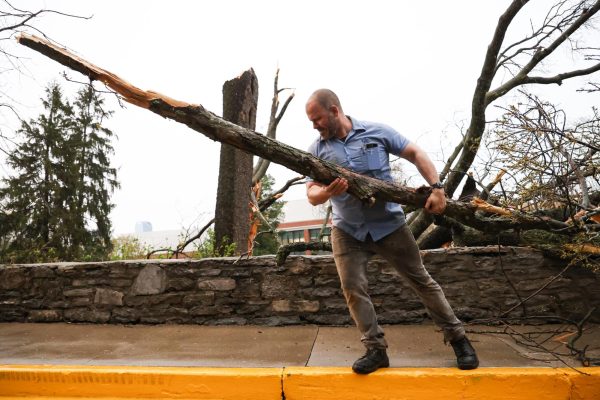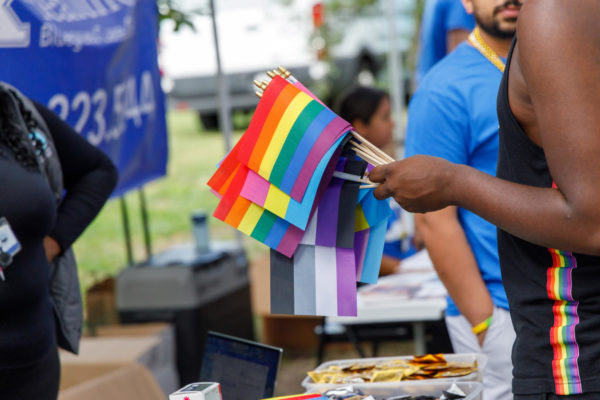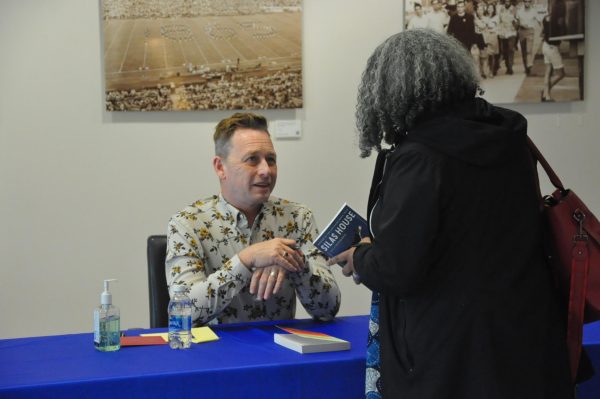To Bee or Not to Bee? UK’s spelling bee may not exist next year
February 25, 2020
50/50.
Those are the odds John Cruz gave of the UK Regional Spelling Bee’s survival.
Cruz, the project manager of the School of Journalism and Media, served as “bee coordinator” this year. UK’s Scripps Howard First Amendment Center has hosted the bee, which has served as the semi-final stage for 81 of Kentucky’s 120 counties for the last nine years.
He said that without the UK bee, Kentucky would potentially have no representative at the Scripps National Spelling Bee, denying student champions the chance to compete on a nationally televised stage.
An all-expenses paid trip to D.C. to compete in the national bee is the main prize at regional bees, which essentially serve as the semi-final stage for spellers.
But now, the bee is in danger. Time and money are the two big concerns, but UK and its colleges also have to think about how the bee fits into its strategic plan.
“We don’t get anything out of it, but this is something I feel like Kentucky needs,” said Cruz.
Students who do not have a regional bee to compete in can still qualify for nationals, but they have to pay for and take a test, said Cruz.
“They essentially would have to go straight from their local bee to the national stage, but more likely what it would mean is that they just simply wouldn’t go,” said Andrew Byrd. Byrd, a professor in UK’s linguistics department, has been the pronouncer at UK’s bee since its beginning.
‘He started everything’
The first UK Regional Bee was held in 2012 and was organized by the then-director of the First Amendment Center, Dr. Mike Farrell. Farrell, a beloved journalism professor, passed away in August of 2019.
“He started everything, he was the person who asked me initially to help,” said Byrd of Farrell.
“He got in touch with the schools, found sponsors if there were sponsors out there, and when he passed we weren’t quite sure if we’d be able to do it anymore, cause it takes money to do it.”
Cruz took over the planning duties after Farrell and thinks that to save the bee, there should be a dedicated bee committee.
Cruz sent 106 fundraising letters out this year. He said the bee costs $8,000 to host, the bulk of which goes to sponsoring the winner’s trip to nationals – hotel, travel and registration.
In addition to sponsoring the winner, the hosting organization has to pay to be an official Scripps bee.
Without a director, the First Amendment Center is on hiatus, said Cruz, and no one is gunning for the bee to happen again. So, for the 481 schools in the UK Regional Bee’s constituency, the chance to compete at nationals may be gone next year.
There are only two qualifying bees in the state this year – the UK regional bee, and a bee in Louisville presented by the Bluegrass Literacy Project.
Founded by five-time national bee competitor Tara Singh, the Bluegrass Literacy Project held its first regional bee in 2019. The organization will host its second annual bee in March for spellers from nine counties in Indiana and 19 counties in Kentucky.
Singh founded the BLP when she was in eighth grade – the final year of eligibility for spellers. In her competitive years, she qualified for nationals through four different regional bees, including the UK Regional Bee.
“The Louisville sponsorship has been tenuous over the last 10 years,” said Singh. She said BLP “took over the sponsorship in order to keep the tradition alive.”
“It’s a great event and holds a special place in the hearts of many people in our community,” said Singh. “Almost everyone I talk to remembers the word they missed in their school spelling bee at some point in their life.”
But the tradition is not just regional; Kentucky played a crucial role in the national competition.
Kentucky’s other winning tradition
“The legacy of the Scripps National Spelling Bee is rooted in Kentucky,” said Valerie Miller, spokesperson for the national Bee. “The Courier-Journal in Louisville originated the national event. In those early formative years, four winners hailed from the Bluegrass State.”
The first two national champions were both from Kentucky, according to a list of champions provided by Miller. But a Kentucky speller hasn’t won the national bee since Marian Richardson in 1938.
This year, the Kentucky Derby Festival will host a bee, but that the event will not send a winner to nationals, Miller said. Previously, the Kentucky Farm Bureau hosted a qualifying bee, but not this year. Cruz said he had to turn away students who usually compete in that bee after they missed the Scripps deadline for UK’s bee.
There are some rural counties that have never participated in the regional bee, Cruz said. Scholarship money is available for schools who cannot afford to send a speller, but many schools do not take advantage of the opportunity.
Cruz said he has seen “an increase in enthusiasm” for the bee over the last couple of years.
“Some of the kids are really gung-ho about it,” said Cruz. “It’s usually the older kids, and then the ones that use their nametag and their finger to spell on the back of it, that’s when I know they’ve really practiced.”
Spellers at the regional bee are the champions of their school bee, said Cruz. Scripps eligibility rules state that students must not have passed beyond the eighth grade, and the competition is open to public, private and homeschooled students.
“Some schools will have whole school bees and that means each kid is getting a little bit of extra literacy development just to get ready for that, and I think that’s a positive thing in a state where education doesn’t seem like a top priority,” said Cruz.
Thirty-nine spellers competed in the 2020 UK Regional Bee last Saturday, the youngest of whom was in the first grade.
For the spellers, spelling bees are not just about academic achievement or literacy development.
“Not only did I learn a lot of words, but I also learned the value of hard work, discipline, and most importantly, resilience,” said Singh. “The ability to persist despite setbacks has served me well.”
Public speaking, confidence, grace under pressure – these are the intangibles that students get from the spelling bee, said Miller.
“I think the wonderful thing about the bee is that adults see the difficulty right then and there -they’re like, yeah that’s a word I don’t know,” said Byrd.
‘Competing against the dictionary’
Many spellers return year after year, and spelling is often passed from sibling to sibling, said Byrd.
That’s true of this year’s winner, 13-year-old Lauren DeVore. Lauren’s older sister Ashley won the UK Regional Bee two years ago and competed in D.C. at nationals.
“I wouldn’t have done if it hadn’t been for her, she got me into it,” said Lauren.
Lauren came in second place at last year’s bee after deciding to compete last minute. As this year’s champion, she will represent Kentucky at the national bee in May.
“I’m really excited because I saw my sister do it and it looked like a lot of fun,” said Lauren.
Lauren, who often congratulated and spoke to her competitors at UK’s bee, said friendliness was something she saw often at nationals.
“When we went with my sister, they told us that you weren’t competing against each other, you were competing against the dictionary, so go ahead and congratulate your fellow spellers,” said Lauren, who added that competitors at the national bee will gather together in the lobby to study.
Her winning word at the UK Regional Bee was “motet” – a polyphonic choral composition on a sacred text usually without instrumental accompaniment, according to Merriam-Webster.
To prepare for the bee, Lauren studied between 368 and 418 words a day.
“Lauren works really hard – she’s not a natural speller, so it was neat to see her hard work achieve things,” said Kim DeVore, Lauren’s mother.
Byrd said that hard work is the commonality among the really good spellers.
“Certainly with the spellers who really succeed, they have to work their butts off to do what they do,” said Byrd, who said spelling was comparable to music or sports practice. To practice, a speller might group words by language of origin or go through reading lists.
Cruz said he knew of one speller who wrote the whole spelling lists on sheets of butcher paper and hung them around his room, reading a sheet every night before he went to bed.
‘Ridiculous words’
Spellers are given an official list of words to study. After eight co-champions were crowned at the national bee last year, the list expanded from 1,000 to 4,000 words.
But as the rounds advance, words can be chosen that are not on the list, said Byrd.
“It’s really scary to be up on that stage as like an 8-year-old and to be asked all these, in my opinion, fairly ridiculous words,” said Byrd.
He always starts with a practice round so that all the spellers are familiar with the procedure, then moves on to easy, then intermediate, then challenging words.
Judges check the words against the Merriam-Webster spelling, said Cruz, who said they get sent a dictionary every year.
As a linguist, Byrd tries to adapt the words to reflect regional variations.
“It’s heavily biased towards the northeastern dialect. One of the things I asked when I was asked initially to do the pronouncing, I said I will do this – however I will mention variants that will be more familiar to the students,” said Byrd, using variations of penny and marry as examples of how to make the bee more inclusive.
“Those sorts of things I think are valuable because you shouldn’t have a bias towards a particular region especially when we’re not in that region,” said Byrd.
For Kentucky, which hasn’t had a national champion in 82 years, spelling bees are a way to supplement literacy education. If the UK Regional Bee goes away, students will have fewer opportunities to practice vocabulary, grammar and definitions.
“In the education community, most people have heard ‘thank goodness for Alabama’ because if it wasn’t for Alabama, we might be last in education sometimes,” said Cruz. “And they send 10 kids to the bee.”














































































































































